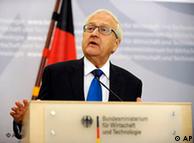印度總理辛格緊急召集各有關部門部長開會,討論下周在新德里舉行的英聯邦運動會準備工作問題。
儘管外界對運動會的主要設施之一---運動員村內的衛生和保安問題存有諸多擔心,但是運動員村仍在周四(9月23日)開門迎客。
BBC在印度的記者說,雖然已經增加了數以百計的工人, 施工還沒有完成。
印度的雨季也增加了施工方面的難度。
英格蘭隊經理說,許多房間都有很深的積水,整個運動員村很危險。
澳大利亞總理吉拉德說,將增派更多官員去新德里加強保安。
新西蘭隊也宣佈,推遲運動員抵達的時間。
*****
新闻报道 | 2010.09.23
德国难御印度吸引力
9月22日傍晚,在登机前往德里之前,联邦经济部长布吕德勒(Rainer Bruederle)承认,本周的印度之行是他首次前往印度。他已经到中国去了20次,去美国的次数更多,但印度从来没有去过。在这方面,德国企业家们行 动就快多了,那些康采恩,但也有越来越多的中小企业发现了这个次大陆的意义。孟买德印商会的施泰因吕克(Bernhard Steinruecke)表示,印度对德国经济的意义越来越大了,他指出,"印度是除中国之外世界上最大的增长市场之一,因此对德国企业来说是重要的。德 国企业来到了印度,部分企业已经在印度待了很长时间,非常成功。不进入这个市场,是个严重的错误。"
印度迅速从世界金融危机里恢复了过来。去年,那里的股值下挫了三分之一,出口额减少了五分之一。而现在印度股票综指Sensex处于2008年后的 最高点,印度政府预期今年的经济增长率将达8.5%。明年人们甚至认为会更高。经济增长造成了对各种工业产品的强旺需求。以印度为重点的企业咨询师瓦姆瑟 (Johannes Wamser)称,德国产品特别被看好,无论是机械制造业的,能源供应业的,还是环境保护领域的。
德国企业不光向印度提供机器、汽车和其它特殊产品,德国康采恩很久以来已经扎在印度,在当地生产了,但不光是大企业,中小型企业也受到了这座次大陆 的吸引。目前有1000家德国企业在印度当地生产。宝马和大众落户在了印度西部的浦那(Puna)和南部的金奈(Chennai)。它们的零配件生产企业 也跟了过去。德国贸易与投资协会的总干事普费弗尔(Michael Pfeiffer)指出,跟中国相比,印度对德国企业来说有一系列重要的优点,他指出,"业务语言是英语。印度的民主体制是一个高度稳定的因素。再就是, 印度有一个有效的司法体系,适用英国法律,这是一种行动比较缓慢的法律体系,但是是一个可靠的司法框架。"
印度1991年才开放它的市场,比中国晚了近10年。这10年是印度需要补上的。孟买德印商会认为,印度在中期对德国企业来说将具有跟中国一样重要 的意义。印度专家瓦姆瑟估计,中国将坚持它的世界车间角色,德国公司的生产地,而印度将成为德国产品的吸收地, 他认为,到中国去,借助那里价格低廉的结构为世界市场生产,这要比在印度容易,但是要走进一个市场,以诱人的价格把技术卖给当地人,这在未来的印度会更容 易。
目前,对德国经济界来说,印度的重要性还远远比不上中国。去年,德中贸易总额达1000亿欧元,而德印贸易总额只有其十分之一。但联邦经济部长乐观地表示,两年后,德国跟印度的贸易额将接近于翻一番。
作者:Christoph Ricking 编译:平心
责编:凝炼
*****
Buying a stake in China Inc is no shortcut to market share Foreign investment in China Even harder than it looks By The Economist
From The Economist
Published: September 23, 2010
AT FIRST glance, Vodafone has nothing to complain about. On September 8th it sold for $6.6 billion the 3.2% stake in China Mobile that it had bought for $3.3 billion between 2000 and 2002. Such a handsome profit ought to be a cue to crack open the champagne and roast some Beijing duck. Yet the British mobile-phone giant did not get what it really wanted: a way into China. In other countries, Vodafone has had a knack of turning a small investment into a controlling stake, but not in the Middle Kingdom. And it is not alone.
Since the late 1990s, several large state-owned Chinese companies have listed their shares. These initial public offerings typically included "cornerstone" investments by big Western firms. For example, BP, Exxon and Shell (three oil firms) and ABB (a Swiss-Swedish conglomerate) took strategic stakes in PetroChina and Sinopec (two big Chinese oil companies). Alcoa, an American aluminium company, invested in Chalco, a Chinese one. And Western banks bought chunks of the leading Chinese state banks when they were listed.
Foreign firms brought several things to the table: capital, technology, management skills and the prospect of better corporate governance. The Chinese press often referred to them as "elder brothers". In return, these Western firms wanted access to China's huge domestic market.
It did not work out that way. The Chinese state-owned firms did not need capital so badly that they were prepared to cede control to foreigners. Some also found that the Westerners had less to teach them than they had hoped. "Fly-in" expat managers were often unfamiliar with China, says David Michael, a partner at the Boston Consulting Group. Chinese firms tended to learn more from multinationals that had taken the trouble to build their own large sales forces in China, he says.
Chinese firms no longer feel like little brothers. China Mobile now has a market value half as large again as Vodafone's. PetroChina is much bigger than BP. Both Chinese firms are now rich enough to buy whatever expertise they want.
Western energy companies were quick to notice this shift. BP, Shell, ABB and Exxon all sold their holdings in state-owned Chinese firms by 2005. Alcoa got out in 2007. Financial firms followed, in whole or part, during the financial crisis. When China's state-owned Agricultural Bank was recently listed, no big Western bank bought a significant stake.
Western firms grumble about their failure to turn their stakes in China Inc into a foothold in the Chinese market, but not too loudly, so that they do not annoy the government. Besides, thanks to a rising stockmarket, most made sacks of money from their investments.
A few have not yet cashed out. Telefónica, a Spanish telecoms firm, owns 8.8% of China Unicom and politely rebuffs bankers who advise it to sell. AT&T has 25% of a telecoms business in the Pudong district of Shanghai. Despite regulatory problems, it provides a nationwide service from Pudong, largely to multinational clients. It is a nice business, but a far cry from the dreams some Westerners once had about China.
西方企業出脫中國持股 外資在中國的夢醒時分
作者:吳怡靜譯 出處:天下雜誌 456期 2010/09
相關關鍵字:經濟學人
從石油、媒體到電信 業,西方企業紛紛出脫在中國的持股,顯示外資開始領悟,中國這塊餅雖大,但很難爭食,因為他們發現,無論資金或技術,中國企業並沒有想像中那麼需要他們。 九月八日,英國行動電信巨擘伏得風(Vodafone)宣布以六十六億美元的價格,出售持有的三.二%中國移動股權。
![]()
伏得風在中國移動的投資,九年翻一倍,值得開香檳慶祝。事實上,擅長以入股投資取得其他企業控制權的伏得風,這次卻在中國踢到了鐵板。
自九○年代後期開始,中國的大型國營企業陸續上市,而且通常都由西方大企業以「基礎投資」方式入股,例如,英國石油、艾克森、殼牌三家大油商與重工 業集團艾波比(ABB)在中石油、中石化這兩大國企都有策略性持股。美國鋁業(Alcoa)投資中國鋁業,而西方銀行更在幾家中國大型國銀上市時,紛紛入 股投資。
這些外資都打著如意算盤:用資金、技術與管理,換取中國內需市場管道。但事與願違,中國的國企並沒有那麼缺錢,而且有些國企發現,西方人能教他們的,也沒想像中的多。
波士頓顧問公司北京代表處資深合夥人麥維德指出,中國企業認為,他們從那些在中國布下龐大銷售網的跨國公司身上,學到的更多。而中國企業也不再是過去的小老弟,中國石油的總市值,如今遠高於英國石油。
不少西方大廠早就察覺風向轉變,英國石油、殼牌、艾波比和艾克森都在二○○五年前,陸續出脫了中國國企的持股。美國鋁業在二○○七年抽腿;西方銀行也在隨後的金融海嘯期間,全部或部份撤出。前陣子中國農業銀行上市,已經看不到西方大銀行搶著入股的盛況。
入股中國,不再是捷徑
大部份廠商都跟伏得風一樣,在出脫持股時,大賺了一票。他們原本把入股中國企業,當作搶攻中國市場的捷徑,踢到鐵板後,就算不高興,也不敢太張揚,免得得罪中國政府。
目前,仍有幾家電信大廠還沒退出中國:西班牙電信(Telefonica)持有中國聯通八.八%的股份;AT&T與上海電信合資成立了信天通信,持有二五%股權。信天的業務以跨國客戶為主,雖然是門好生意,但比起許多業者當初的中國市場大夢,還是差了十萬八千里。

沒有留言:
張貼留言